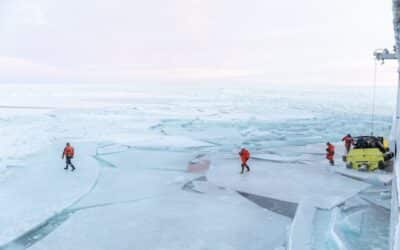Rather than reducing emissions to stop the climate crisis, geoengineers are dumping chemicals into the ocean
Planetary Technology, a Canadian company, plans to dump 450 tonnes magnesium hydroxide into the sea in St. Ives Bay, Cornwall UK as part of an ocean alkalinity enhancement scheme, which raises concerns for the ‘Hands Off Mother Earth! Alliance. The experiment poses a potential serious risk to marine ecosystems and the Celtic Sea grey seal population.
The HOME! Alliance stands in solidarity with the local community who have called to “Keep our seas chemical free”. They are concerned about possible unintended negative side-effects and call for an independent environmental impact assessment.
Planetary Technology claims that the Ocean Alkalinity Enhancement (OAE) experiment will decrease the acidity of seawater and remove carbon. In theory, this would happen by adding magnesium hydroxide to the water in the bay, however this approach has not been proven.
In fact OAE has been identified by the London Convention and Protocol on Ocean Dumping as having adverse impacts on marine ecosystems. A briefing from the Centre for International Environmental Law and the Heinrich Boell Foundation highlighted that in a statement adopted in the first week of October, over 100 countries announced their intention to regulate four techniques, one of which is OAE, due to ‘the potential for deleterious effects that are widespread, long-lasting or severe’.
Other concerns about the experiments by Planetary Technology raised by civil society include:
- The company has commercial interests, for example Planetary has sold CO2 credits to Shopify and Stripe without yet removing any CO2.
- Magnesium hydroxide occurs naturally as brucite, but the deposits are small. For industrial use, therefore, it is usually precipitated from sea water and then dried at high temperatures. This process requires so much energy that producing magnesium hydroxide may use more carbon dioxide than is captured through the enhanced weathering process.
- There are a number of concerns about the technical approach and safety of OAE. A recent article in Nature highlights the technical challenges around the technology.
In late 2022, Planetary Technology announced plans to conduct similar pilot trials in the Bedford Basin and in Halifax Harbour in Nova Scotia, Canada. According to a report from Dalhousie University, the company will be working with Nova Scotia Power to experiment with the effluent from the Tuft’s Cove Generating Station.
Joining the call of local businesses, conservationists, activists, surfers and youth, the HOME! Alliance calls on the licensing authorities and local water company to stop the experiment by Planetary Technologies, protect marine ecosystems from future experiments and to support real climate solutions.



